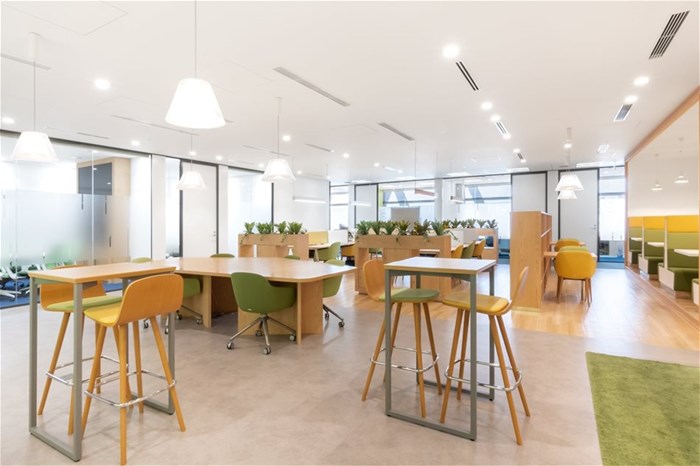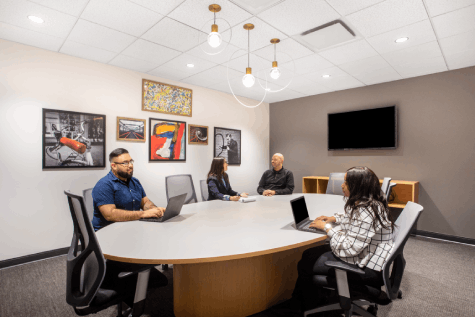
Top stories






More news


Marketing & Media
Ads are coming to AI. Does that really have to be such a bad thing?














Flexible and co-working spaces have long been a lifeline for small- and medium-sized businesses. But, as we ease out of the ‘new normal’ of home working, they’ll increasingly become a part of the picture for large-scale companies, too.
With slick meetings technology and group-chat-style project management on hand – and long commuting distances a reality for many, priced out of urban centres – making long trips into one head office seems less logical or efficient than ever.
It’s not a trend solely sparked by the pandemic, either: In the past two to three years, many larger businesses have been actively looking for ways to downsize their permanent space in favour of offering more widespread flex- or coworking spaces to their employees. A recent Institute of Directors study showed that a staggering 74% of employers aim to stick with increased remote-working after the pandemic.


A case in point: in February, Standard Chartered Bank signed a ground-breaking deal with IWG Plc. Regus and Spaces in South Africa that will grant 95,000 of its employees’ access to 35,000 IWG workspaces across the globe.
They were followed by IWG’s biggest client to date, the Japanese telecommunications company NTT, whose recent deal enables its 300,000 employees’ access to a global network of flexible office spaces.
“This arrangement gives flexibility to our colleagues, as well as driving greater inclusion,” explained Standard Chartered’s group head of talent, Tanuj Kapilashrami. Going forward, the bank’s headquarters will perform a completely different function, she explained: to induct employees, to meet with customers and to collaborate on top-level innovations.
Meanwhile, hybrid workers will be able to drop in to centres nearer to their home – when collaboration, superior facilities and tech (or even just quiet time) is needed.
The age of workplaces being seen as one main office, with uniform rows of desks and a photocopier at the end, are over, Tanuj predicts. “We want to use our premises very differently – to induct our employees, meet customers, collaborate and innovate.” The focus will move to learning from employee feedback, “asking what works best, and feeding that back into the organisation.” The company’s goal, she emphasises, is to measure “the behavioural changes we see in how work gets done” to find the optimum balance of central office, home-working and flex space ‘hub’ offices for employees.
While co-working spaces have been a favourite of entrepreneurs and small businesses for some time, adding flex-space to the mix as part of a hybrid working approach is increasingly alluring to bigger companies.
As well as saving on the cost of long leases on central properties, many want to lighten their carbon footprint – a side-effect of slimming down their workforce’s commute with a local office option.
Employees will thank their companies for a flexible approach, points out IWG’s CEO Mark Dixon – and talent will likely start to shop around based on who has adapted to a hybrid style. “If you make your workforce happier by giving them more balance, then they’re going to be more productive. You’re going to have less churn and you’re going to keep your talent, because your people aren’t wasting their time commuting unnecessarily.”
“We’ve seen many businesses that are considering the change or making the change,” Dixon continues. “Companies like Standard Chartered are early adopters of something that, in a year or two years’ time, will be the norm for many companies.”
IWG is leading the workspace revolution. Our companies help more than 2,5 million people and their businesses to work more productively. We do so by providing a choice of professional, inspiring and collaborative workspaces, communities and services.
Digitalisation and new technologies are transforming the world of work. People want the personal productivity benefits of living and working how and where they want. Businesses want the financial and strategic benefits. Our customers are startups, small- and medium-sized enterprises, and large multinationals. With unique business goals, people and aspirations. They want workspaces and communities to match their needs. They want choice.
Through our companies we provide that choice, and serve the whole world of work: Regus, Spaces, No18, Basepoint, Open Office and Signature. We create personal, financial, and strategic value for businesses of every size. From some of the most exciting companies and well-known organisations on the planet, to individuals and the next generation of industry leaders. All of them harness the power of flexible working to increase their productivity, efficiency, agility and market proximity.
Join us at www.iwgplc.com